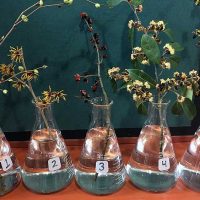Selected Cuttings from the Home of Roy Farrow, WA Park Arboretum Grounds Supervisor

1) Acer palmatum ‘Katsura’ Japanese Maple
Japanese maples have been cultivated in Japan for over 300 years. While they are most known for their stunning fall colors, I personally enjoy them as much in the spring for their new leaf color.
‘Katsura’ is a cultivar which appears to have bright orange new leaves, but on closer inspection, the leaves are bright yellow with a red margin.
Spring Transition at the Washington Park Arboretum

1) Cornus mas Cornelian Cherry
This yellow flowering tree that blooms in late winter to early spring, is native to southern Europe and southwestern Asia.
The common name refers to the fruit that matures in late summer. The fruit has many cultural uses including jams, medicine, beverages, tools, and spears.
There is a grove of this Cornus at the Center for Urban Horticulture along NE 41st Street.
Arriba for Azaras!

Azara is a genus of plants native to the temperate and subtropical regions of South America. The Chilean name for these plants is Corcolén. The genus contains only ten species, four of which you can find growing here at the Washington Park Arboretum! All species of Azara are evergreen shrubs to small trees. Although some species of Azara are considered to be borderline hardy in our Pacific Northwest climate, we have had success growing them at the Arboretum.
Read moreOur 2020 Northwest Flower and Garden Festival Display: “Gateway to a Greener Earth”

The following ex-situ conservation plants are all listed as endangered in their region of origin due to habitat loss and climate change:
1) Araucaria araucana Monkey Puzzle
This unique looking conifer is native to the Chilean Andes and considered a living fossil dating back over 60 million years.
The Mapuche Pehuenche people of the Andes value these trees for their edible seeds and spiritual significance.
All About Hamamelidaceae: The Witch Hazel Family

1) Corylopsis glabrescens Fragrant Winter Hazel
Corylopsis are Asian natives which bloom in late winter or early spring with profusions of sunny yellow flowers dangling from bare branches.
Corylopsis glabrescens is the hardiest of the genus and can grow up to 15 feet high and wide.
Flower buds are about to burst open on this shrub in the Witt Winter Garden.
Selected Cuttings from the Washington Park Arboretum

1) Abies pinsapo var. marocana
This fir is native to Morocco, where it occupies a small area in the mountains south of Tetuan.
Not as tall as the type, this variety has needles similar to A. pinsapo but are wider and longer.
Located along the Arboretum Loop Trail, just south of parking lot #19.
2) Cunninghamia konishii
Cunninghamia is a genus of just three species native to northeastern Asia.
Read moreNew Selected Cuttings Welcome the New Year to the Washington Park Arboretum

1) Illicium henryi Henry’s Star Anise
Native to China, this pungent plant is related to culinary star anise (Illicium verum). Specimens can be found on the Sino-Himalayan hillside and along the western edge of the Magnolia Collection.
The genus name Illicium comes from the Latin for “allurement” or “inducement from an enticing scent”. This refers to the aromatic scent released by bruised or crushed leaves.
Winter Interest at the Washington Park Arboretum

1) Edgeworthia chrysantha Paperbush
Native to China, the inner bark of this plant may be used to make quality paper.
The silvery flower buds will open in mid-winter to very fragrant, creamy-yellowish flowers.
Edgeworthia can be found on the west side of the Graham Visitors Center in the Pacific Connections China Garden and the Witt Winter Garden.
2) Hamamelis vernalis ‘Christmas Cheer’ Witch Hazel
This witch hazel is native to the Ozark Plateau.
Read moreHoliday Arts and Crafts Sale in the Miller Library

The annual Holiday Arts and Crafts sale in the Miller Library opens December 6th. This year we’ll have hand-knit items, kitchen wares with botanical flare, dramatic necklaces and more.
Read more